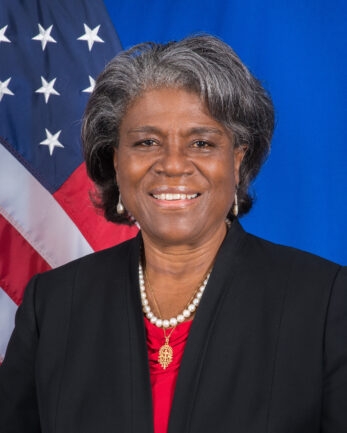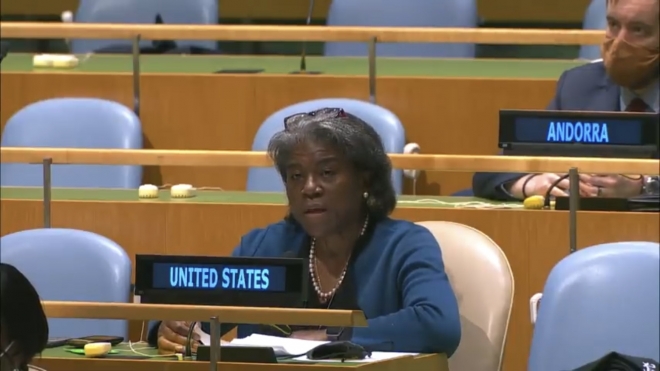애틀랜타 총격 사건 충격 속… 인종차별 철폐 국제협약 비준 촉구

(사진=더블유타임즈, 제공=United States Mission to the United Nations)
린다 토머스-그린필드(Linda Thomas-Greenfield) 미국 유엔대사는 "나는 인종차별의 추악한 얼굴을 안다. 인종차별 속에 살아왔고 경험해왔다. 그리고 인종차별에서 살아남았다"면서 증오범죄의 심각성을 거론하고 백인 우월주의의 해체를 촉구했다.
미 CBS 방송에 따르면 토머스-그린필드 유엔대사는 21일 세계 인종차별 철폐의 날을 앞두고 열린 유엔 총회 회의에서 '인종차별·외국인 혐오증 및 관련 편협성 철폐'라는 주제로 흑인으로서 겪은 개인사를 얘기하며 인종차별 철폐를 호소했다.
그의 연설은 지난 16일 밤 한인 여성 4명을 포함해 총 8명의 목숨을 앗아간 조지아주 애틀랜타 총격 사건을 계기로 미국 사회 등에 인종차별주의 및 이에 따른 크고 작은 증오범죄 문제가 재조명되는 가운데 나온 것이어서 더욱 주목받고 있다.
그는 연설에서 "나는 노예의 후손"이라며 "나의 증조할머니 메리 토머스는 1865년 노예의 자식으로 태어났으며 나는 인종차별이 만연한 남부 지역에서 자랐다."라고 개인사를 언급했다.
10대 때 베이비시터로 일했다는 그는 "고등학생 때 내가 돌봐주던 한 소녀는 내가 'N'으로 시작하는 단어(흑인을 폄하해 부르는 표현)에 해당하는 사람이 맞는지 물어왔다. 그의 아버지가 나를 그렇게 부르곤 했기 때문이었다"라는 일화도 전했다.
그는 인간을 우열 그룹으로 분류해온 잘못된 대표적인 형태가 "백인 우월주의"라고 강력하게 비판하며 전 세계로 확산된 운동인 '흑인 목숨도 소중하다(BLM: Black Lives Matter)'도 언급하였다.
또한 그는 특히 라틴계, 무슬림, 시크교도, 유대인, 이민자에 대한 증오범죄가 최근 3년간 증가했다는 내용의 연방수사국(FBI) 발표를 언급하며, "증오범죄가 지난 10년간 볼 수 없었던 수준으로 증가했다"라고 지적하고 "이는 신종 코로나바이러스 감염증(코로나19) 발생 이후 아시아계 미국인이 직면했던 괴롭힘과 차별, 폭력을 제대로 담아내지 못한다”면서 아시아계 미국인을 상대로 한 증오범죄의 심각성을 언급했다.
토머스-그린필드 대사는 조 바이든 미 행정부가 우선시하는 과제에 인종차별 문제를 바로잡고 아메리카 원주민 부족의 주권을 존중하며 외국인 혐오 및 아시아·태평양계에 대한 차별과 싸운다는 목표도 포함되어 있다고 강조했다.
그는 "바이든-해리스 행정부는 코로나19 대유행과 경제 위기가 인종과 소수민족 집단에 얼마나 불균형적으로 타격을 입혔는지 알고 있다"면서 긴급 지원금 지급 등 사회에 도움이 될 것으로 판단되는 단계들을 밟아가고 있다고 말했다.
그리고 이는 시작에 불과하며, 다른 나라들도 우리와 함께 하기를 요청하면서 "모든 나라가 모든 종류의 인종차별 철폐를 위한 국제 협약을 비준하고 시행해야 한다"라고 촉구하고 "이것이 결국은 미래를 형성하는 것”이라고 강조했다.
그러면서 "모든 사회에 있는 고유한 인종차별을 밖으로 드러내고, 차별을 뿌리 뽑고 우리의 근간에 썩은 부분을 없애기 위해 앞으로 나아가야 한다" 라고 밝혔다.
토머스-그린필드 유엔대사는 "아이들에게 두려움이 없는 미래, 폭력이 없는 미래를 물려줘야 한다.”면서 이런 미래를 아이들이 물려받길 나는 희망한다"라고 말하며 발언을 마무리했다.

(사진=더블유타임즈, 제공=United States Mission to the United Nations[Press] Youtube)
다음은 린다 토머스-그린필드 미국 유엔대사의 발언 전문이다.
Thank you, Mr. President. Thank you for convening us to commemorate this important day. And I thank the Secretary-General, Madam High Commissioner, and Dr. Iweala, for your leadership in pressing us all to do more toward the elimination of racial discrimination, wherever and by whomever.
This meeting – this commemoration – is personal to me. I am a person of African descent. But more importantly, I am a descendant of slaves. My great grandmother Mary Thomas, born in 1865, was the child of a slave. This is just three generations back from me.
I grew up in the segregated South. I was bused to a segregated school, and on weekends, the Ku Klux Klan burned crosses on lawns in our neighborhood. When I was in high school, I was asked by a little girl, for whom I babysat, if I was an N-word because her dad had used that word for me.
I know the ugly face of racism. I lived racism. I have experienced racism. And I survived racism.
And through this process, I learned a simple truth: Racism is not the problem of the person who experiences it. Those of us who experience racism cannot, and should not, internalize it, despite the impact that it can have on our everyday lives.
We must face it down, every time, no matter whom it’s directed towards.
Racism is the problem of the racist. And it is the problem of the society that produces the racist. And in today’s world, that is every society. And in so many of our communities and countries, racism is endemic. It’s built in, like a rot in a frame. And it remains, and it festers, and it spreads because many of those in charge allow it to. Others look away and pretend it’s not there. But like a cancer, if ignored, it grows.
Today, we commemorate our joint commitment to end all racial discrimination. And we take stock of our efforts during the midterm review of the Decade of People of African Descent. In America, conducting that review requires a reckoning – a reckoning with our dark history of chattel slavery.
Four-hundred-and-two years ago, African slaves were forced onto the shores of the colony of Virginia. Two years ago, the 1619 Project brought attention to this anniversary, and put the consequences of slavery, and the contributions of Black Americans, back at the center of our history and of our national narrative. As the project detailed, slavery is the original sin of America. It’s weaved white supremacy and black inferiority into our founding documents and principles.
The Legacy Museum in Alabama traces this history, and if you’ve not been there, I encourage you all to take a trip. Its exhibits draw a direct line from slavery to lynchings to segregation to mass incarceration and testify to this terrible history and the impact it is having on our people today.
But even though slavery is our original sin, America is not the original source of slavery. Others share this shame with us. Slavery has existed in every corner of the globe. Africans enslaved fellow Africans long before the American colonists existed. And sadly, in many places around the world, slavery still exists today.
As the scholar Isabel Wilkerson argues, humans in all contexts have ranked human value, pitting the presumed supremacy of one group against the presumed inferiority of others. In America, that takes many forms. Chief among them: our legacy of white supremacy.
This year, the senseless killing of George Floyd, Breonna Taylor, and so many other Black Americans sparked a reckoning with racial justice, a movement that spread across the world: Black Lives Matter.
And because Black Lives Matter, we need to dismantle white supremacy at every turn. This means looking at other kinds of hate, too.
The FBI has reported a spike in hate crimes over the past three years – particularly against Latino Americans, Sikhs, Muslim Americans, Jewish Americans, and immigrants. The most recent data shows hate crimes rising to a level not seen in over a decade. And that doesn’t even capture the bullying, discrimination, brutality, and violence that Asian Americans have faced since the outbreak of COVID-19.
The mass shooting in Atlanta is only the latest example of this horror. At President Biden’s direction, we are flying our flag at half-staff at the U.S. Mission to the United Nations, to honor the victims of this terrible, senseless tragedy.
It is so important we stand together – we stand unified – against this scourge. In unity, we have strength. But divisions and misperceptions about each other work against all of us.
We also need to recognize that racism is far from unique in America. Across four decades and four continents in the Foreign Service, I experienced racism in countless international contexts, from overly zealous searches at airports, to police racially profiling my son, to being made to wait behind white patrons for a table at a restaurant. Racism was and continues to be a daily challenge wherever we are.
And for millions, it’s more than a challenge. It’s deadly. Like in Burma, where Rohingya and others have been oppressed, abused, and killed in staggering numbers. Or in China, where the government has committed genocide and crimes against humanity against Uyghurs and members of other ethnic and religious minority groups in Xinjiang.
The prevalence, and pervasiveness, of racial discrimination might make the situation look hopeless. But let me be clear: I remain hopeful. I am hopeful because I have seen how communities and countries can enact change. And I have experienced that progress in my own lifetime.
Personally, I am just one example of what hope and strength can do. After all, this descendant of slaves is before you today as the U.S. Representative to the United Nations. The first chapter of my life story – born in poverty to uneducated parents – this could not have been predicted.
So I ask, what can we do to promote change and keep hope alive for victims of racism?
We can’t control the hate in people’s heart. But we can change the rules that give them license. That’s how I’m sitting here. It’s why we were able to welcome Vice President Kamala Harris to the UN this week. It’s why President Biden’s cabinet is the most diverse in history and includes the first Native American named to a cabinet post.
We can make our communities, and our governments, reflect our highest aspirations – even if some individuals still fall short. We can act. And in the Biden-Harris administration, we are doing just that.
In the first 60 days, the President has made this a priority: from redressing racial discrimination in housing, to ending private prisons that warehouse young black and brown men, to respecting the sovereignty of Native American tribes, to combatting xenophobia and discrimination against Asians, Asian Americans, and Pacific Islanders.
The Biden-Harris Administration also recognizes how the COVID-19 pandemic and economic crisis has been disproportionately damaging to members of racial and ethnic minorities. So, we have taken steps, like providing emergency relief funds, increasing access to nutritious food, and passing* federal student loan payments, that we know will particularly help Black and brown communities.
To be clear, this is just the beginning. Ending racial discrimination, particularly in our criminal justice system, will be an ongoing top priority for the President, and for the entire Biden-Harris Administration. And we ask that other countries join us.
We call for all countries to ratify and implement the International Convention on the Elimination of All Forms of Racial Discrimination. After all, this is about shaping the future. It’s shaping the future we want for our children, and our grandchildren, and their grandchildren.
Already, they are demanding we do better. They are coming up with new ideas and they’re pushing for progressive action. They’re asking more from their politicians and their governments. And they’re in the streets, marching for charge.
They say that “Black Lives Matter.” Because they do.
They chant: “This is what democracy looks like.” Because it is.
This is the American way.
We have flaws. Deep, serious flaws. But we talk about them. We work to address them. And we press on, in hopes that we can leave the country better than we found it.
We can do the same on a multilateral scale. Let us expose the racism and racial discrimination endemic in every society, around the globe. Let us press forward, to root out that discrimination and remove the rot from our foundations. And on this day dedicated to ending racial discrimination, as our flags fly at half-staff, let us leave our children a less hateful, more hopeful world.
Let us give them a future. A future without fear. A future without violence. That is the legacy that I hope they can inherit.
Thank you.
박지원 기자
desk@wtimes.kr
◎ 더블유타임즈 W-TIMES 무단복제-재배포 금지
◎ 더블유타임즈 W-TIMES Copyright Protected
